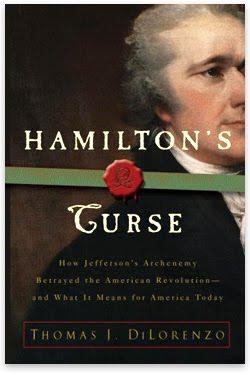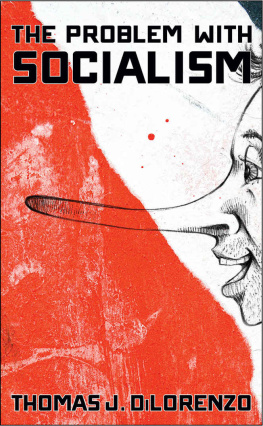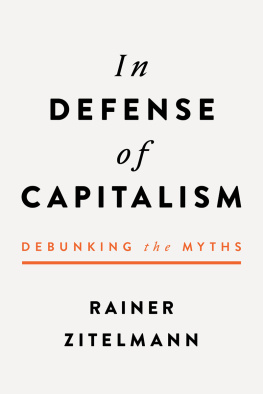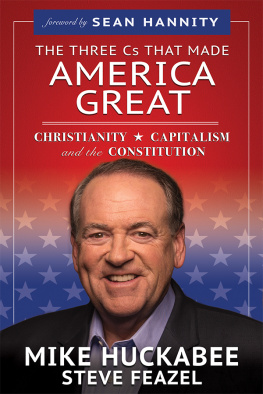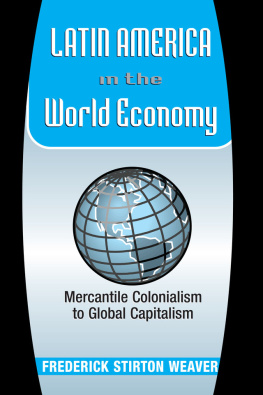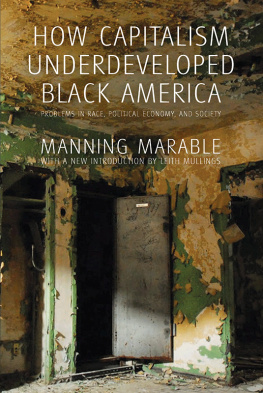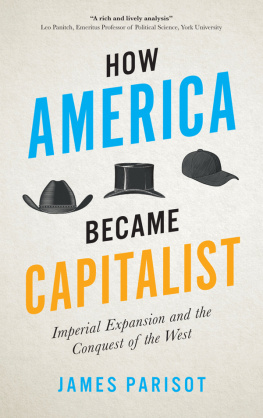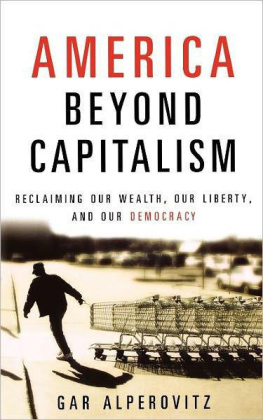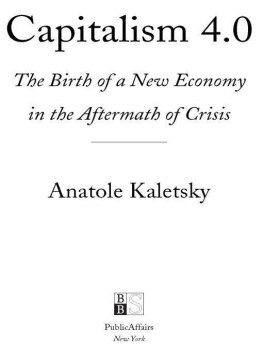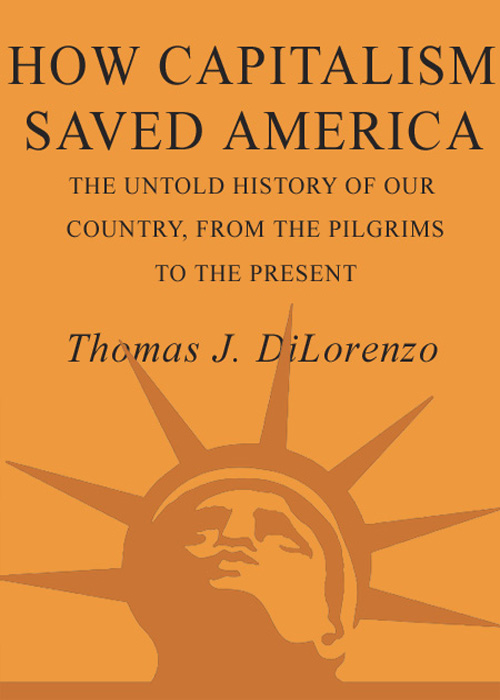

CONTENTS
To Ludwig von Mises, the twentieth centurys most dedicated and accomplished champion of free markets, individual liberty, and the free society
INTRODUCTION
The Untold Story
Ignorance, as well as disapproval for the natural restraints placed on market excesses that capitalism and sound markets impose, cause our present leaders to reject capitalism and blame it for all the problems we face. If this fallacy is not corrected and capitalism is even further undermined, the prosperity that the free market generates will be destroyed.
Congressman Ron Paul, Has Capitalism
Failed? (July 9, 2002)
THE WORD capitalism was coined by none other than Karl Marx, who hoped that it would help in his crusade to denigrate the system of private property and free enterprise and to promote socialism. Marx insinuated that the only beneficiaries of capitalism were the capitalists. Of course, nearly every one of Marxs assumptions (government would wither away under communism, capitalism would make workers poorer, etc.) turned out to be wrong, including this one. Free-market capitalism, based on private property and peaceful exchange, is the source of civilization and human progress. Human beings have a natural propensity to truck, barter, and exchange, as Adam Smith said more than two centuries ago, and free-market capitalism is by far the best-known means by which this can be accomplished.
In his famous treatise The Wealth of Nations, Smith neatly summed up the essence of how capitalism works: Give me that which I want, and you shall have this which you want.1 In other words, commerce is what economists call a positive-sum game. The act of buying and selling always benefits both buyer and seller; otherwise they wouldnt trade with each other. Voluntary exchange in the free market is mutually advantageous.
Unfortunately, this simple fact of economic life is misunderstood or ignored by many commentators who cling to the discredited Marxist notion that one person gains in business at the expense of someone else. This nonsense is spread throughout the popular culture. It was on display in the movie Wall Street, for instance, in the now-famous greed speech, when Michael Douglass character explained that business is all a zero-sum game: somebody wins, and somebody loses. Nothing could be further from the truth, but Hollywood is full of movie scripts that spread silly, neo-Marxist propaganda such as this. And it is not just movies that perpetuate these myths. Many American universities are quite hostile toward capitalism, and during the twentieth century an entire class of intellectuals, journalists, television executives, private foundations, and others coalesced to form what might be called the anti-industry industry. Anticapitalist ideas and institutions are alive and well in the United States. Indeed, author and filmmaker Michael Moore has become a wealthy man by making outrageous and unsupportable claims about supposedly evil capitalists and by promoting socialism, and he is just one of many people spreading myths about capitalism.
These myths are inflicting great costs on the American economy and society. The more Americans feel that capitalism needs to be reined in, or that the public has no say in an economy that is largely in the hands of plutocrats, the more the government is called on to regulate the economy. Congressman Ron Paul, Republican of Texas, is exactly right: Because of a widespread misunderstanding of what capitalism is, our leadersand also much of the general publicincorrectly blame capitalism for any economic problems we face. Consequently, they are all too quick to recommend bigger government as the solution.
Sure enough, in the wake of the corporate accounting scandals that became public starting in the late 1990s, anticapitalist demagoguery has become pervasive. Pundits, politicians, and intellectuals have argued that such fraud is an inherent and unique feature of capitalism and that, therefore, the government needs to impose more regulations on financial markets, the accounting profession, and corporations in general. But fraud is not a feature unique to capitalism: we find wrongdoers not just in the corporate world but also in government, in charities, in religion, and everywhere else. In addition, there are laws against fraud, and those who commit fraud quite often end up in jail; thus it is ridiculous and irresponsible to wage a general political campaign against capitalism when the laws already in place address the problem of wrongdoing.
Nor is the threat of a jail sentence the only deterrent to corporate fraud. The anticapitalists who call for more government regulation also ignore what Congressman Paul calls the natural restraints placed on market excesses that capitalism and sound markets impose. Businesspeople have great incentives not to commit fraud because they know that sooner or later no one would want to do business with them if they were somehow manipulating the market, and that they would ultimately lose money or even go bankrupt. And these natural restraints are much weaker, perhaps even nonexistent, in the government sector. Thus, if fraud were a problem it would probably be a much bigger problem in the government regulatory agencies than in the businesses they are supposed to be regulating.
The most important point that the anticapitalists overlook or ignore is this: overwhelming evidence indicates that the more regulations, controls, taxes, government-run industries, protectionism, and other forms of interventionism that exist, the poorer a country will be. Big government invariably causes higher unemployment, higher prices, shortages of goods and services, and myriad other problems that can be eliminated only by more, not less, voluntary exchange on the free marketthat is, by capitalism. Excessive government controls are precisely why the countries of western Europe lag so far behind the United States economically.
And the opposite is also true: the more economic freedom a nation hasthe more economic opportunity there isthe more vibrant that countrys economy will be.
A careful review of our nations history reveals a long series of myths that demonize capitalismand just how pernicious such myths are. Capitalism supposedly harmed the working class during the industrial revolution; is prone to monopolization; harms consumers with dangerous products; generates macroeconomic instability; harms the environment; exploits the Third World; breeds discrimination; is a cause of war; and on and on.
This is all untrue. In this book, we will learn about the realities of capitalism in the United States: how, from the very beginning, capitalism has been vital to Americas growth, and how excessive government interference in the economy has only exacerbated economic problems and stifled growth.
THE REAL STORY ABOUT CAPITALISM IN AMERICA
Today there is so much confusion about capitalism that what politicians and pundits often label capitalism is just the opposite: interventionism. A good example of how commentators wrongly blame capitalism for causing problems occurred in August 2003, when the American Northeast experienced an electric power blackout. On Sunday, August 24, 2003, just over a week after the blackout, the New York Times ran a front-page story announcing in the opening paragraphs that the electricity grid was an afterthought during the decade-long process of deregulating the power industry and that deregulation increased the vulnerability of the grid. But the article flatly contradicted itself in the third paragraph, where the
Next page

